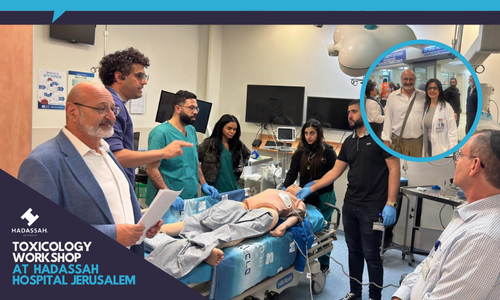
Professor George Braitberg AM, one of Australia’s leading emergency medicine and toxicology experts, recently visited Israel, providing training to emergency physicians at Jerusalem’s Hadassah Hospital.
Prof Braitberg conducted a workshop on the acute management of toxicological emergencies, sharing advanced protocols and clinical insights. He worked in close partnership with Dr Ahmad Nama, Director of Emergency Medicine at Hadassah Ein Kerem, who had previously completed a fellowship under Prof Braitberg’s supervision at the Royal Melbourne Hospital.
The workshop’s advanced toxicology simulation was enormously important, particularly in training residents, explains Dr Nama. “The simulation has a tremendous impact on our daily practice — especially when delivered by Prof Braitberg, whose expertise truly elevates the experience. It sharpens our clinical thinking, expands our knowledge, and provides us with essential tools to approach toxicology cases systematically.”
Dr Nama also noted that the Hadassah Medical Organization (HMO) is planning to send a fellow from the paediatric emergency department to train with Professor Braitberg in Australia, with the goal of building toxicology expertise in both Jerusalem and the broader region. “Our vision is for HMO to be a leading centre in clinical toxicology,” he added.
To ensure that Prof Braitberg’s expertise reaches emergency rooms throughout the country, the workshop was followed by a Zoom webinar, with participants from several of Israel’s key hospitals.
Prof Braitberg visited the Emergency Department at Hadassah Mount Scopus with its director, Dr Shaden Salameh, and toured the Gandel Rehabilitation Center, where he was deeply impressed by the scale and quality of care being offered to wounded civilians and soldiers.
Describing the meaningful professional exchange he experienced during his visit to the Hadassah hospitals, the professor said his ongoing connection with the Hadassah Medical Organisation was a deeply personal story. “Proud to be an Australian and be associated with this wonderful organisation (Hadassah)”, he posted after his visit.
The visit followed Prof Braitberg’s earlier deployment to Israel as a volunteer physician in the immediate aftermath of the October 7 terrorist attacks. He worked alongside trauma teams at Hadassah as casualties were airlifted in from the south, recalling that “the entire team was ready in the trauma unit” and adding, “I was grateful to help and immensely proud of the wonderful people who work here”. As the son of Holocaust survivors, he spoke of the emotional weight of this moment, saying, “I’ve treated victims of forest fires, shootings, and other mass-casualty events, but nothing compares to what happened here. Not just the sheer number of lives lost, but the way in which it happened. It left an indelible mark.”
As Director of Emergency Medicine Research at Austin Health and a Professor of Emergency Medicine at the University of Melbourne, Prof Braitberg has maintained deep ties with Israel and the Jewish community as a clinician and academic.
He also expressed concern about the rise in antisemitism in Australia following the October 7 attacks. “My mother, a Holocaust survivor, has told me how disturbed she is by what she’s seeing. I ask myself, why does she have to be exposed to this again?”
Prof Braitberg’s time in Jerusalem underscores the enduring relationship between Australian and Israeli medical professionals. Hadassah Australia continues to champion this partnership, supporting life-changing initiatives like the Gandel Rehabilitation Center, which reflects the generosity of the Australian Jewish community and its commitment to healing and hope in Israel.
Back to Newsletter